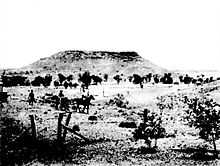Kimberley Downs

Coordinates: 17°23′56″S 124°21′22″E / 17.399°S 124.356°E Kimberley Downs Station, commonly referred to as Kimberley Downs, is a pastoral lease that operates as a cattle station in Western Australia.
Location
Kimberley Downs is situated about 76 kilometres (47 mi) east of Derby and 154 kilometres (96 mi) northwest of Junjuwa community. It is accessed via the Gibb River Road.[1]
The Lennard River flows through the property and a neighbouring property is Meda Station.[2]
The land is a mix of black soil plains with a high cracking black clay content. These areas are grassed with Bundle Bundle grass, Ribbon grass, Flinders grass and Feathertop wiregrass. There is also a large area of open woodland.[3]
History
The property was established in the early 1880s.[4] In 1900 Maurice Coleman Davies, who owned neighbouring Balmaningarra Station, also acquired Lennard River Station and a portion of Lillimilura Station, forming Kimberley Downs Station.[5] Davies later owned and managed both Kimberley Downs and Napier Downs Stations.[6]

In 1910 Kimberley Downs occupied an area of 900,000 acres (3,642 km2) and was carrying 30,000 sheep. Eight white men were employed permanently on the property with the bulk of the work being carried out by Aboriginal workers.[7]
The entire flock was sold off from the property in 1916. 11,400 ewes, 4,400 wethers and 340 rams were sold in one lot, thought to be the largest sale of sheep in one line at the time in Western Australia.[8] The property was stocked with cattle and soon after the cattle tick first appeared in the West Kimberley regions. Kimberley Downs, Yeeda and Obagama were all affected by the ticks.[9]
In 1931 80 head of cattle were found to have pleuropneumonia in one muster.[10] The disease meant cattle had to be quarantined.[10][11]
In 1976 the property, along with neighbouring Napier Downs, was owned by the Australian Land and Cattle Company and being managed by Bob and Sheryl McCorry. The properties had a combined area of 3,516 square miles (9,106 km2) and were stocked with approximately 20,000 head of cattle.[12]
See also
References
- ↑ "Kimberley Downs WA". Exploroz. 2013. Retrieved 15 January 2014.
- ↑ "Kimberleys Tragedy". The West Australian (Perth: National Library of Australia). 4 April 1938. p. 13. Retrieved 14 December 2013.
- ↑ Meg Flavelle (2002). "Kimberley Grasslands field curing guide". Department of Agriculture. Retrieved 13 December 2013.
- ↑ "Concerning People". The Register (Adelaide: National Library of Australia). 12 May 1913. p. 6. Retrieved 14 December 2013.
- ↑ "Register of Heritage Places – Assessment Documentation". Heritage Council of Western Australia. 28 February 2006. Retrieved 14 December 2013.
- ↑ "Advertising.". The Northern Times (Carnarvon, Western Australia: National Library of Australia). 8 December 1906. p. 2. Retrieved 14 December 2013.
- ↑ "Notes from the North-West.". Sunday Times (Perth: National Library of Australia). 11 September 1910. p. 17. Retrieved 14 December 2013.
- ↑ "Finance and Commerce". The West Australian (Perth: National Library of Australia). 23 March 1916. p. 5. Retrieved 14 December 2013.
- ↑ "Cattle Tick in Western Australia". The Brisbane Courier (Queensland: National Library of Australia). 2 July 1918. p. 8. Retrieved 15 December 2013.
- ↑ 10.0 10.1 "Stock diseases". The West Australian (Perth: National Library of Australia). 4 November 1931. p. 4. Retrieved 15 December 2013.
- ↑ Newton, L. G.; Norris, R. (2000). Clearing a Continent: The Eradication of Bovine Pleuropneumonia from Australia. Csiro Publishing. pp. 138–139. ISBN 0643102469.
- ↑ Sheryl McCorry (2008). Diamonds and Dust: A Sheryl McCorry Memoir 1. Pan Australia. ISBN 1741981085. Retrieved 12 December 2013.